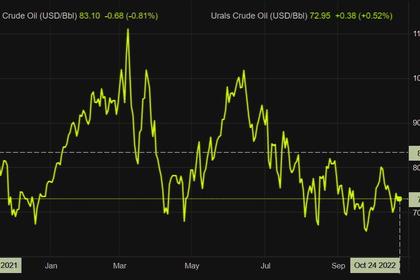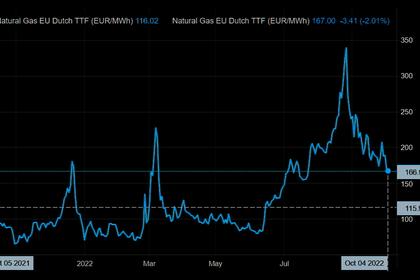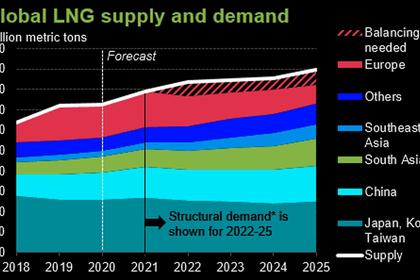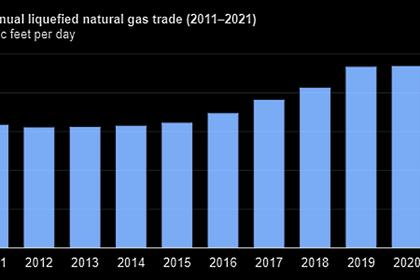
GAS: A KEY ROLE
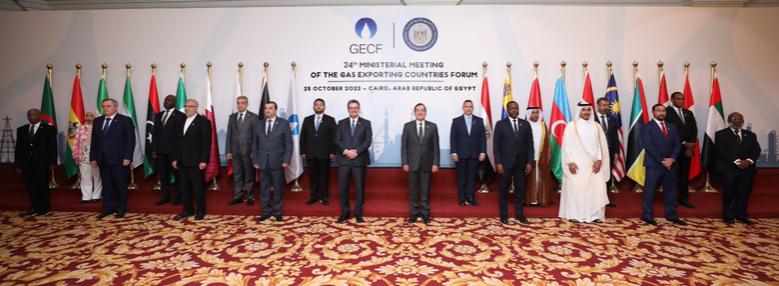
GECF - 25 October 2022 Cairo, Egypt - Ministerial Statement of the GECF Ministerial Meeting
The 24th Ministerial Meeting of the Gas Exporting Countries Forum (GECF) was held on 25 October 2022 in Cairo, the Arab Republic of Egypt. His Excellency Tarek El Molla, Minister of Petroleum and Mineral Resources of Egypt, chaired the meeting in his capacity as President of the GECF Ministerial Meeting for 2022.
The meeting was attended by the energy ministers and top officials from Members Algeria, Bolivia, Egypt, Equatorial Guinea, Iran, Qatar, Russia, Trinidad and Tobago, and Venezuela, as well as from Observers Angola, Azerbaijan, Iraq, Malaysia, Mozambique, and the UAE.
The Minister in charge of energy of Papua New Guinea attended the meeting as a guest, as well as a high-level official from Mauritania.
In his opening remarks, HE Minister El Molla said: “We are convening at a critical time when global efforts are dedicated towards achieving the energy trilemma for security, sustainability and affordability. As the cleanest hydrocarbon fuel, natural gas is seen as the perfect solution that strikes the right balance, and will continue to play a key role in the future energy mix. Egypt is eager to work closely with all GECF members to develop applicable and realistic initiatives that ensure both energy security and a just energy transition pathway.”
The Ministerial Meeting emphasised the GECF objective of supporting the permanent sovereignty of its member countries over their natural resources and their ability to independently plan and manage the sustainable, efficient, and environmentally conscious development, use, and conservation of natural gas resources for the benefit of their people, including through cooperation with neighbouring countries without restrictions.
It also reiterated the importance of cooperation and coordination between Member Countries and reaffirmed its support for genuine and strengthened dialogue between producers, consumers, and other relevant stakeholders with the objective to ensure the security of demand and the security of supply, as well as open, transparent, unhindered, and non-discriminatory gas markets.
The Ministerial Meeting discussed at length the multidimensional crisis that encompasses the economy, energy, trade, health, environment, and geopolitics. It noted with concern the rising risks stemming from gloomy economic prospects, inflation unseen in decades, tightening financial conditions, and supply-chain disruptions. The escalating geopolitical tensions coupled with the economic restrictions imposed on some countries have made the prospects even more uncertain. The adverse impacts on people’s standard of living are substantial. They are even larger among the poorest, and in particular in developing countries.
The Meeting underscored that natural gas markets are undergoing dramatic changes in terms of physical flows, market functioning, contractual arrangements, and investment. It observed that while gas hubs experience extreme volatility, long-term gas contract prices are more stable and predictable. It expressed great concern with regard to the attempts to alter the price discovery and risk management functions of markets, and to impose politically-driven price caps. It underlined that such artificial intervention in market functioning can only aggravate market tightness, discourage investment, and be detrimental to producers and consumers alike.
It observed that underinvestment since 2015 on the back of very low gas prices and misguided calls to stop investing in natural gas projects resulted in supply-demand imbalance, which has been exacerbated by geopolitical tensions and as Europe became the preferred destination for LNG cargos to compensate for reduced pipeline flows. Market tightness is expected to continue in the medium-term, as the majority of new projects will come on stream only after 2025.
The Meeting listened to a presentation on the global gas outlook, which projects that natural gas share in the energy mix will increase from 23% today to 26% in 2050, underpinned by population growth, doubling of world GDP, improved standards of living, and policies and technology aimed at improving air quality and mitigating climate change. The Meeting reaffirmed that natural gas, the cleanest burning hydrocarbon, will play a pivotal role in sustainable development and in a just and inclusive energy transition. It constitutes a key lever to meet the UN Sustainable Development Goals (SDG) and the Paris Agreement’s long-term objectives.
The Meeting expressed its support for the African countries in their fight for alleviating energy poverty, in particular through unhindered access to financial resources as well as improved energy security with the view to bring prosperity to their people. It called for cooperation, consistent with UN SDG 7, and the overarching principle of common but differentiated responsibilities in the Paris Agreement, to ensure sufficient investments and financing in all segments of the value chain on the African continent, as well as to provide balanced risk sharing between producers and consumers in order for natural gas to support the least developed and developing countries in their fight to improve food security and alleviate energy poverty to ensure just and inclusive energy transition that leaves no one behind.
It noted the huge level of investment required to satisfy growing world energy demand. It underscored the importance of timely investment for market stability, and the crucial need for unhindered flow of financial resources and access to technology in a non-discriminatory manner. They reemphasised the crucial need for security of supply and security of demand, and for collaboration to protect critical gas infrastructure and enhance resilience to natural disasters, technological incidents, and man-made threats, such as malicious use of information and communication technologies.
The Meeting emphasised the importance of critical energy infrastructure (both national and international) for the free flow of gas and stable functioning of global gas markets and condemns any deliberate attacks to damage such infrastructure.
The Meeting congratulated Egypt for holding this year the UN Climate Conference, COP 27, and expressed its hope and support for the great success of this important Conference and noted that COP 28 will also be organised in a GECF member country, the United Arab Emirates. COP 27 and COP 28 present a great opportunity to make a case for gas in the energy transition as well as to meet UN Sustainable Development Goals, and in particular in Africa’s development.
The Meeting considered the Management Report presented by HE Eng Mohamed Hamel, Secretary General, and adopted the financial report for 2021, the budget for 2023. It listened to presentations on the Forum’s flagship publications, the Global Gas Outlook, the Annual Short-Term Gas Market Report and the Annual Statistical Bulletin.
The Meeting was pleased to adopt the second edition of the Long Term Strategy of the Forum, which will be publicly available.
With the view of promoting the international outreach of the GECF, the Meeting welcomed and approved the new Procedure of New Members, Observer Members, and Dialogue Partners.
It also noted, with satisfaction, the progress made by the Gas Research Institute as well as the planned signing of the Host Government Agreement on 8 November 2022 in Algiers. It reiterated the importance of expanding cooperation in natural gas technologies such as carbon capture and storage, gas flaring and methane emissions reduction and gas in the transportation sector, and exploring new areas to leverage the advantages of natural gas for hydrogen production and other new gases.
The Ministers recorded their satisfaction with the progress made by the People’s Democratic Republic of Algeria in the preparations for the 7th GECF Summit of Heads of State and Government, to be held in Algiers in November 2023.
The Ministerial Meeting appointed HE Gabriel Mbaga Obiang Lima, Minister of Mines and Hydrocarbons of the Republic of Equatorial Guinea, as President of the Ministerial Meeting for 2023, and HE Saad bin Sherida Al-Kaabi, Minister of State for Energy Affairs of the State of Qatar and President and CEO of QatarEnergy, as Alternate President for the same period.
Furthermore, the Ministerial Meeting appointed Mr Dmitry Semyonov from the Russian Federation as the Executive Board Chairman for 2023, and Eng. Alaa Adel Hagar from the Arab Republic of Egypt as the Alternate Chairman of the Executive Board for the same period.
The 25th GECF Ministerial Meeting will convene in Malabo, Equatorial Guinea, in October 2023.
The Ministers and Heads of Delegation expressed their appreciation for His Excellency Abdel Fattah El Sisi, President of the Arab Republic of Egypt. They also extended their sincere gratitude to His Excellency Tarek El Molla, Egyptian Minister of Petroleum and Mineral Resources for leading and navigating the GECF under Egypt’s 2022 Presidency, and finally for the Government and the people of Egypt for their warm hospitality and excellent arrangements.
-----
Earlier:
